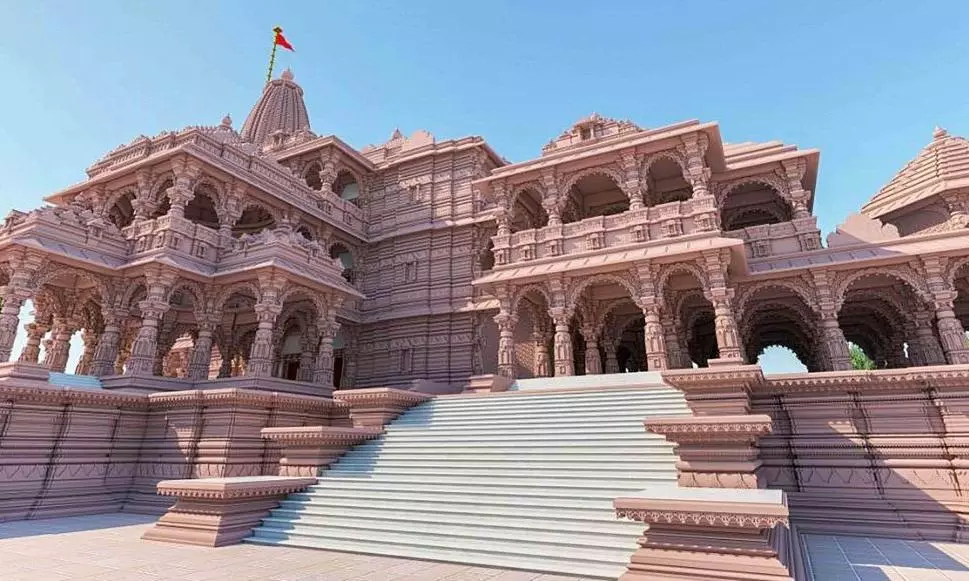
Adverts that tell all
text_fieldsThe construction of the Ram Temple in Ayodhya is progressing on the land where the Babri masjid stood till its demolition in 1992. On the 100th day from the bhumipujan ceremony that preceded the launch of the construction, there came an advertisement in national newspapers including in regional languages, seeking contributions for the temple. The advert was released by the trust formed by the central government to build the temple, 'Shri Ram Janmabhoomi Teerth Kshetra'. It being a trust formed as per the Supreme Court directive in the Babri land dispute case, there is nothing legally wrong about such a fund raising. But all the same there is an ominous politics that gets transmitted by implication through this advertisement. The wording in the advert's caption 'Ram Janmbhoomi Mandir Re-estalishment of National Self-respect' – which appeared on the front pages of the newspapers - is not only not an innocuous one, but is a precise proclamation of Hindutva politics, as any observer of contemporary India's trends can easily glean. Therefore, there is more to it than meets the eye, and has an indication of the political agenda of Hindutva politics.
Those with a smattering of history can easily recall the sequence of events since the installation of an idol of Ram in the Babri Masjid on the night of 22 December 1949. We have also seen how the highest court of the country treated that entirely unilateral encroachment, after 69 years from the event. For, the court gave its judgment solely based on the belief of a section that the land is the birthplace of Shri Ram thereby ratifying the contention of a party to the case, whereas the Shri Ram of their belief is one whose existence cannot be proven by any historical or verifiable facts, and is one who existed only in legends and epics. The said verdict has by now been perceived as a compromise formula rather than one delivered through a scrupulous scrutiny of evidence. Hence the allocation of a different plot of land at a different location for the construction of a mosque. And the Muslim leaders of the country, even as they realised that the judgment was far from fair, decided to accept the verdict as a writ of the highest court. But now the advert makes it clear that the said judgment would not put a full stop to the dispute, but only mark the birth of new issues.
The call in the advertisement is to 'contribute voluntarily for the renovation and reconstruction of Shri Ram Janmabhoomi Temple at Ayodhya'. Mark the wording 'reconstruction'. It amounts to saying indirectly that there existed a Ram Temple in the Babri masjid land, whereas there is no historical evidence to support the implied contention. Construction of the temple is described as 'swabhiman'. Even before the court's judgment, RSS chief Mohan Bhagwat had described the temple in the same words several times. In other words, the language with the epithets used are not accidental. This also acts as a counter to the argument by others who took a stand against Hindutva fascism by declaring that the self-respect of India was lost through the demolition of Babri masjid. For this very reason this 'swabhiman' project will have to be seen as a government version comparable to mob lynching by Hindutva activists on the streets. What is common to both phenomena is the rampage and war cries conducted under the umbrella of power.
It is clear that the intent of such advertisements is not merely raising the funds for the construction of the temple. When a temple is being built in the name of Shri Ram as a face of the Hindutva nationalism on the same spot where there once was a Muslim mosque, it is important for frenzied politics to make it an occasion for challenge and defiance. The message highlighted through this is of 'building a new nation' being evolved by the government in parallel with the Shri Ram temple construction. Within a week from the foundation stone laying of the temple, the trust had received over Rs 60 crore by way of contribution. Even now funds are flowing into the account. Although temple construction can easily be accomplished through these means, that need not necessarily make it sufficiently a popular exercise. It also forms a litmus test to identify those who are skeptical of a temple construction project including 'believers' and the political parties of that stance.
It was as a part of this that the BJP challenged the Congress a few days ago to raise Rs 101 crore for the temple. What would be the stand of the Congress, which has not so far expressed any opposition to the court's judgment or to the temple construction? It may not be easy for other secular parties either to avoid this trap. This challenge, mocking at secularism and pluralism, will only serve to destroy the very essence of the great idea of India. If this is the story of a concession Hindutva achieved in the name of compromise, what would be the striking power of the muscular politics it follows on the back of political power? The new war-fronts against fascism should share this thought too.























